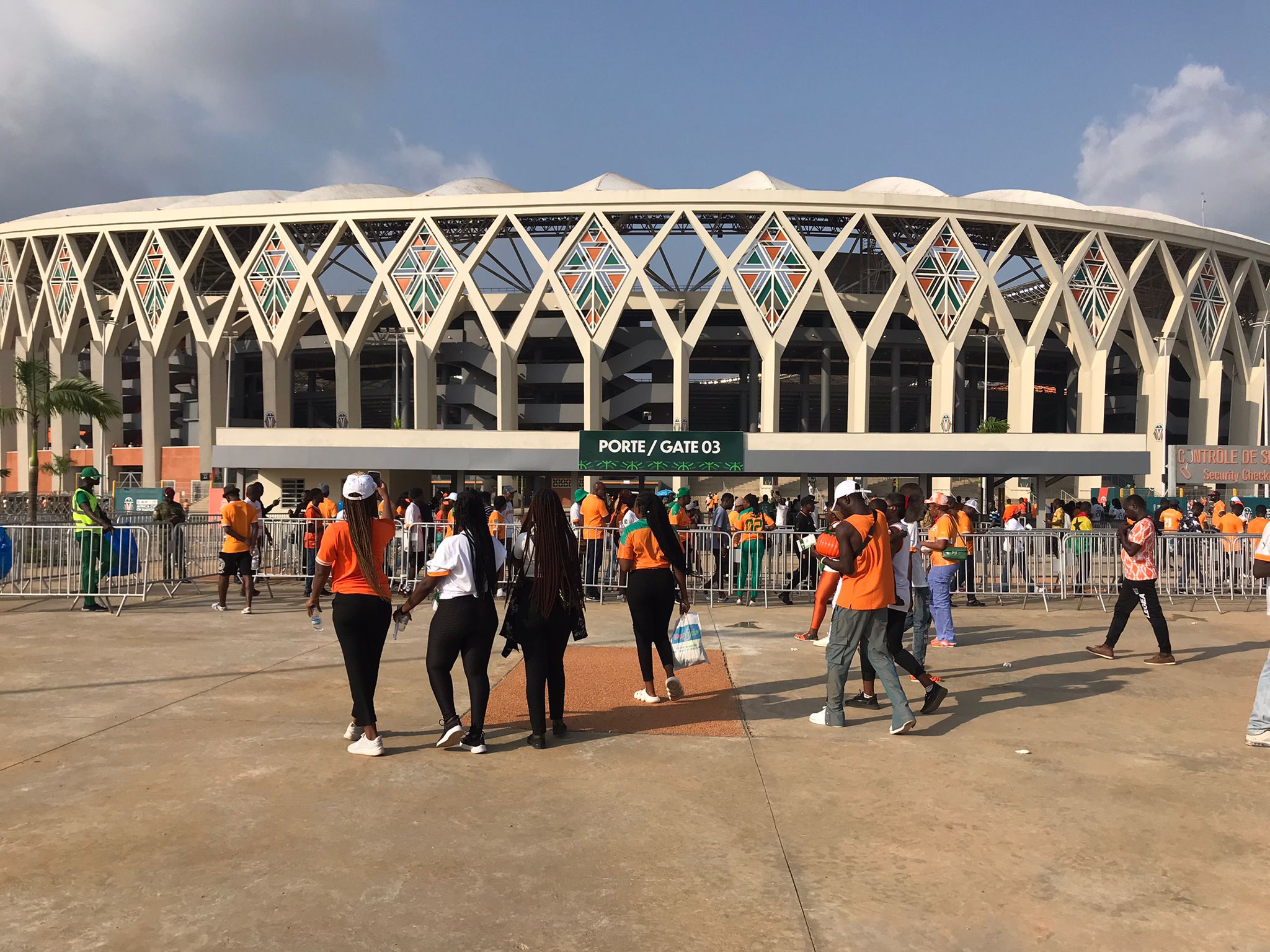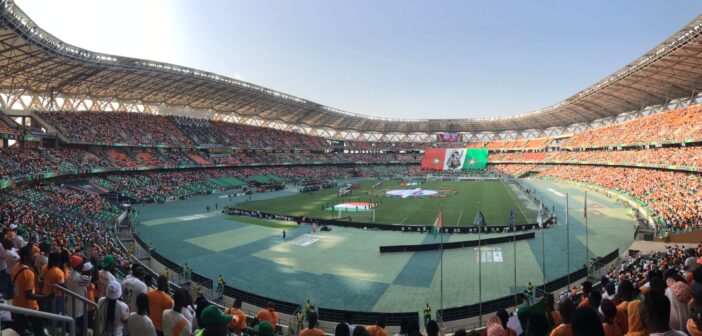As the African Cup of Nations draws to a close, Rhys Hartley looks back on his experience at the tournament and what it meant to the locals and participating countries.
Merci Côte d’Ivoire!
We could hear the rhythmic beats of traditional African drums and some muffled singing as we waited for our visas to be processed. It got louder the closer we got to passport control before we were hit with a carnival atmosphere as soon as the sliding doors opened and we were in the Arrivals Hall. Bienvenue a Côte d’Ivoire! We had arrived.
Our plane had landed from Brussels via Benin, and I had spotted a number of football shirts on board – the green and white of Nigeria, green and red of Cameroon, and the ubiquitous orange of our hosts for the next 10 days.
Another plane landed just after us in Abidjan – the de facto capital of the Ivory Coast – and a sea of men and women clad in the white of Guinea and waving their national flags piled into the arrivals hall behind us. But that wasn’t to prepare us for what we were about to witness.
The live music accompanied with plenty of dancing made us feel like we had entered into another world. Not since the World Cup Brazil 2014 had I received such a welcome at an airport and there was a real feeling that this was a country where football was the order of the day – or month.
It was late at night when we arrived at our neighbourhood of Koumassi but there was no sign that things were dying down.
Open-air bars were packed with punters keenly watching the post-match analysis of the earlier games that night, smoke raised from the street food stalls that served fresh fish and chicken, while shacks were set up on every corner selling an array of football shirts. Cote d’Ivoire, check. Guinea, check. Mali and Senegal? Yep, they had it.
The international media before the tournament emphasised the importance of the hosts going ‘deep’ into the tournament to ensure good crowds but the Ivory Coast – and especially the metropolis of Abidjan – is a melting pot of West African cultures.
The ‘father of the nation’, President Felix Houphouet-Boigny, invited hundreds of thousands of guest workers from neighbouring countries to Cote d’Ivoire in his attempt to build an advanced capitalist society in the 1970s and many of them have stayed, despite successive Civil Wars in the country in the 2000s. As a result, we spotted just as many shirts around the streets of Abidjan of other nations as we did the hosts.
On our way to the cool, beach-front neighbourhood of Blockhauss – overlooked by the diplomatic quarter and the imposing Sofitel (the home of AfCON’s machine for the tournament) – we dived into a local bar after we heard some cheering.

Fans gather for the match against Equatorial Guinea
Photo: Rhys Hartley
We struggled to find a seat but were quickly welcomed to share a table with a group of three, when we noticed that everyone in the bar was kitted out in matching Burkina Faso replicas.
A penalty put them ahead against heavy favourites, Algeria, and the place went wild with dancing, hugging, and a ‘Santè’ in our direction. They thought we’d brought them luck!
It wasn’t to last, as Algeria scored a last-gasp equaliser, sending our new friend across the table into tears. We quickly bade farewell, and I committed to buying a shirt of my new adopted team for the tournament.
While comments from abroad may focus on the lack of crowds in some games (a 2pm Friday kick-off of Cape Verde v Mozambique didn’t exactly capture the imagination – and we must remember that 40% of the population live below the poverty line), each game was watched with the same intensity, no matter who was playing nor the time of day.
Every TV across the country was tuned into French broadcaster Canal Plus’s dedicated channel to AfCON 24/7, and it was clear that football had gripped the nation.
People may roll their eyes at the importance of football but it has been credited with bringing to an end the first Civil War in Cote d’Ivoire. After qualifying for the World Cup in 2006, Didier Drogba – possibly the country’s most famous export – announced that the country’s next match would be played in Bouake, the heartland of the rebellion. A shock move but one that saw opposing forces sit together in the stands and crowds flock the pitch in unison after their 5-0 victory over Madagascar.
The ‘Elephants’’ success has certainly had an impact on maintaining the peace in this divided country since then, being a symbol that everyone can unite behind. That was the impression that the government and wider population wanted to impart upon us visitors and everyone else watching from around Africa and beyond at this year’s tournement.
However, all was not well on the pitch.
In the impressive 60,000-seater stadium in Ebimpe, around 30 kilometres north of downtown Abidjan, Cote d’Ivoire played their final group game against unfancied Equatorial Guinea, knowing that a point would probably be enough to get them through.
An expectant crowd grew impatient as a cagey first half an hour passed before a shock goal saw the visitors take the lead. VAR intervened to deny two goals to the boys in orange, who seemed to panic from there on in. They attacked in numbers but left holes at the back, which the experienced Equatorial Guineans used to their advantage to stun the tournament’s hosts.
They ran out 4-0 winners against all the odds, leading to plenty of unsavoury scenes in the stands, on the running tracks, and on the way back into town – we spotted a row of the shuttle buses put on for fans with their windows smashed in completely. It really was more than just a game.
Nobody believed that Côte d’Ivoire would go through, needing results in every other group to go their way for them to be among the best third-placed teams with just three points and a goal difference of minus 3.
It came down to the penultimate night of the group stages. Ghana had a worse record than them, so they just needed one other team to finish in third with a worse record. Morocco to beat Zambia. Easy, right?
In Bouake, the second-largest city, every man, woman and child was glued to the TV, urging the North Africans to do them a favour. A first-half goal eased the tension for a while but the second half dragged on with no further goals.
Cue wild celebrations, with people lifting chairs above their heads and dancing all around the bar. All of a sudden, a group of young men with their shirts off started running past the bar and onto the city’s main thoroughfare, whistling and cheering, as cars beeped their horns. The country came to a standstill as they celebrated their unlikely qualification to the next round.
With the hosts still in the competition, I bade my farewell to the tournament as part of a sell-out crowd at the smaller 30,000-seater stadium in Abidjan.
After walking for hours for two days straight in the 35-degree heat trying to find a ticket, we left it until an hour before kick-off to source a tout in the vicinity of the ground. A late second goal saw the ‘Super Eagles’ of Nigeria kill off the ‘Indomitable Lions’ of Cameroon after a spirited performance, as the Nigerians partied long into and the Cameroonians made plans to return home.
Contrary to the theme of this year’s tournament, this wasn’t a shock result – but there were plenty of those to come. Cote d’Ivoire are somehow still in the competition! They defeated tournament favourites, Senegal, in the Round of 16 before a last-minute equaliser saw them take Mali to extra time with just 10 men, going on to win the tie in the last minute of the additional 30.
Other shocks included World Cup semi-finalists Morocco, Mohamed Salah’s Egypt, and heavily-fancied Algeria bowing out early in a poor tournametn for North African sides.
While a Nigeria v Cote d’Ivoire final may seem expected, a semi-final lineup including South Africa and the Democratic Republic of Congo was not on anyone’s mind going into the tournament – even less so following the first few rounds of group games! But, in a country where football is taken so seriously, it so fits that the product on offer has been so gripping.
This is the most exciting tournament I’ve been lucky enough to witness (personal Welsh affiliations aside) and the welcome we received from the moment we touched down to the second we left will stay in the mind even longer than the football.
Whatever happens this weekend – Merci, Cote d’Ivoire (and bon chance)!
Follow us on Twitter @ProstInt
Internationals
African Football
![Prost International [PINT]](https://prostinternational.com/wp-content/uploads/2021/08/PINTtFontLogoRoboto1536x78.jpg)



